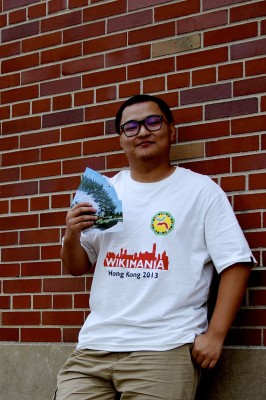Dueling Encyclopedias: Using Weibo to Boost Wikipedia in China
This article was previously published on Wikimedia's blog as Using social media to engage Wikipedia readers and editors in China, by Addis Wang on December 4, 2013. Republished under Creative Commons lisence
Wikipedia editor Addis Wang has developed an approach to spreading awareness of Wikipedia in the People’s Republic of China (PRC). He and several collaborators use an account on Weibo–a Twitter-like social media platform that is the 7th highest trafficked website in China–to promote both Wikipedia’s content and its global community to Chinese readers.
This is no small challenge. For the 20 percent of the world’s population that live in the People’s Republic of China, Wikipedia is a distant runner-up to Baidu-Baike, a for-profit Chinese encyclopedia that hosts 6.7 million articles. Like Wikipedia, Baidu is collaboratively written. But its policies on content licensing, censorship and review are not as open as Wikipedia’s (Wikipedians have also noted that several of its articles are copied from English Wikipedia without attribution).
Baidu’s dominance may be due in part to Wikipedia’s limited availability in the PRC in past years. The domain zh.wikipedia.org could not be visited normally in Mainland China from 2005-2008. Today Wikipedia is approximately the 150th-most trafficked domain in China (according to comScore, Wikimedia projects are the 5th most-visited globally; according to Alexa, Baidu is the most-visited site in China). Many Chinese citizens aren’t even aware that Wikipedia exists in their language, which obviously makes contribution more difficult.
Addis’ idea, which is funded by a Wikimedia Foundation Individual Engagement Grant, aims to tackle these problems using social media to reach China’s huge online audience. Weibo is an ideal platform for giving people a taste of what Wikipedia has to offer. “In Chinese you can fit a lot more information into 140 characters than you can in English,” says Wang. And like Twitter, Weibo allows users to upload images. In April 2013, Wang and his colleagues began posting abstracts for a different Wikipedia article every day through their dedicated Weibo account.
They usually feature quirky or unusual articles. Wang explains, “we try to choose interesting articles to grab peoples attention.” Some of these posts have gone viral. For example, a summary of the English Wikipedia article for the sound of fingernails on a chalkboard in Chinese got 52 reposts and 21,000 views within the first week.
Wang also uses the Weibo to drive interactive community-building campaigns. One campaign, inspired by a late-night post from a Chinese reader, invited people to post stories about their “Wikipedia addiction.” Another campaign focused on introducing Chinese readers to the community behind Wikipedia. In July 2013, Wang posted an announcement about the upcoming Wikimania conference in Hong Kong. He promised that anyone who re-posted the announcement to their Weibo network would be entered into a drawing to receive a postcard mailed from Hong Kong during the conference. This campaign received 239 entries, and resulted in 300 more followers for the account.
With nearly 10,000 followers gained in less than 6 months, the Wikipedia Weibo account has also become a great tool for spreading the word about events, such as local Wikipedia Meetups (a recent one at Dalian University of Technology had 60 attendees). Wang is also using Weibo to promote an upcoming Wiki Loves Monuments campaign.
These social media campaigns have resulted in some new contributions to Chinese Wikipedia. Wang worked personally with one follower who became interested in contributing after the Wikimania campaign, walking him through the process of uploading pictures of a local railway tunnel that was the site of an historic event to Wikimedia Commons. Wang believes that contributing has a positive impact on the individual as well as on Wikipedia: “When you’re editing Wikipedia, you’re learning things,” he says, “you’re actually elaborating the ideas in your mind.”
While experienced Wikipedians like Addis Wang help new people overcome the technical challenges of learning to contribute, there are also social and legal challenges and misunderstandings to address. Given loose attitudes about copyright in China, Wang says it is more difficult to teach new contributors how to avoid plagiarism when editing articles in line with Wikipedia’s policies. And he notes, “in China, people associate Wikipedia with WikiLeaks.”
Wang is optimistic about the potential for Wikipedia in China. He believes that Chinese people can have a big impact by learning about Wikipedia’s free and open approach to knowledge. He sees social media outreach as a way he can help multiply this impact. “Social media is one of the best ways to reach people directly in China. I started this project because I realized that my ability to contribute as an individual was tiny,” he says. “If I contribute an article a day, I can only create, at most, 365 articles a year. But if I get even 1 person a week to join Wikipedia, I can have a much greater impact on content. And also bring more ideas and perspectives.”
Interview and profile by Jonathan Morgan, Research Strategist, Wikimedia Foundation
Writing and editing contributions from Siko Bouterse, Head of Individual Engagement Grants, Wikimedia Foundation
Content contributions from Addis Wang, Wikipedian and Individual Engagement Grantee.
Support our work
Since Rising Voices launched in 2007, we’ve supported nearly 100 underrepresented communities through training, mentoring, microgrants and connections with peer networks. Our support has helped these groups develop bottom-up approaches to using technology and the internet to meet their needs and enhance their lives.
Please consider making a donation to help us continue this work.





2 comments